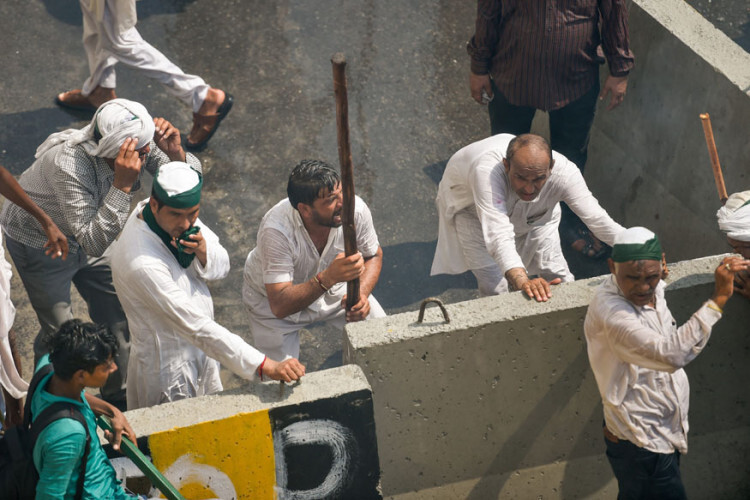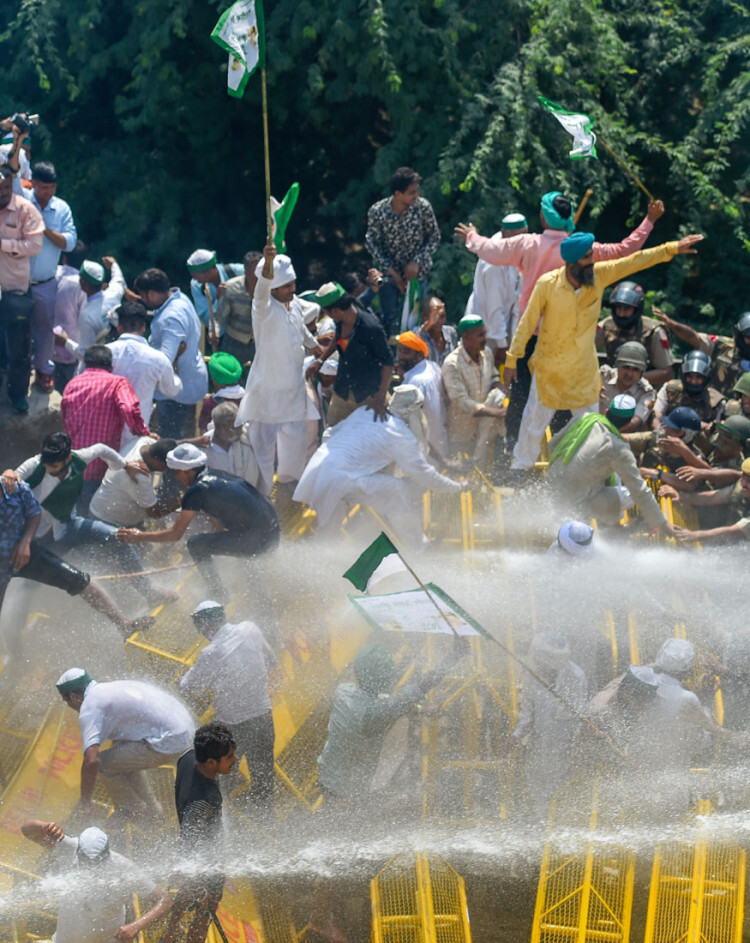
views
New Delhi: The streets of Delhi were empty and quiet. Shops and offices were closed. Traffic lights turned red, but there were no cars to stop. The Metro had vacant seats. Being Gandhi Jayanti, it was a national holiday and most of the public was enjoying the day off.
But just outside the city limits, at the border with Uttar Pradesh near Ghazipur, thousands of farmers were at work.
Leaders of Bharatiya Kisan Union alongside a drove of farmers from Uttar Pradesh, Punjab, Haryana, Uttarakhand and Rajasthan, after marching for nine days, rallied at Delhi border, only to be halted by heavy police barricading, water cannons and tear gas. But the police relented and allowed them to enter the capital after midnight.
The march - ‘Kisan Kranti Padyatra’ or farmers’ revolutionary walk - had started in Haridwar on September 23 and was supposed to end at Kisan Ghat, the memorial site of former Prime Minister and farmer leader Chaudhary Charan Singh, in New Delhi on Tuesday.
The BKU was demanding that the recommendations of the National Commission on Farmers be implemented. Their demands, 11 in all, included that farmer loans be waived, payments for sugarcane produce be released, electricity and fuel costs for farmers be reduced and agricultural implements be sold GST-free.
The farmers, estimated to be around 70,000, sat on their tractors and on the roads near the Ghazipur flyover, staring at the police barricades that stood between them and the national capital.
With their march halted in a violent fashion and their demands still not met, their anger swelled against the BJP government.
“Since 2014, when Modi came to power, our condition has worsened. Never in history has our sugarcane payments been delayed for so long. The Prime Minister had said it will come in 15 days. It has been over six months,” said Amrish Rathi, a farmer from Chhachhrauli, a village in Muzaffarnagar district in UP.
“We must have lost our minds that we voted for BJP in 2014. We had thought maybe they will do good work. Everybody should get a chance. But look what happened. Modi became Prime Minister and now we are also on the verge of selling tea,” he added.

Farmers protesting at Delhi-UP border try to break through a police barricade on Tuesday. (PTI Photo)
Rathi and his fellow farmers from Chhachhrauli said they will keep these years in mind while voting in 2019. He said he still had to receive Rs 70,000 as payment for his sugarcane produce.
Satyendra Kumar, also from the same village, has Rs 65,000 due. “We went to Haridwar, travelled for nine days and there was no trouble. The moment we came to Delhi border, they greeted us with lathis, water cannons and tear gas. Many of us were injured. We just want to put our demands forward,” Kumar said.
“Kisan Ghat pe kisan nahi jayega to kaun jayega,” he asked.
Chaudhary Narendra Singh, BKU head from Amroha in UP, said the farmers would not budge before their demands are met. “Either let us go to Kisan Ghat, or accept our demands here and now,” he said.
In the ensuing struggle to cross the police barricade, several farmers were injured and about 50 tractors were damaged. Farmers said the police punctured their tyres. “They think they will stop us here. But we have come prepared. We have rations for 10 days. We will not go back before we are heard,” Singh said.
The rally was led by Naresh Tikait, BKU president and eldest son of Mahendra Singh Tikait, a renowned farmer leader from Muzaffarnagar district who had led a historic BKU rally of nearly five lakh farmers to Delhi’s Boat Club in 1988 with similar demands.
Sixty-year-old Ompal Singh Malik from Kudana village of the district had marched with the farmer leader then, 30 years ago. He was marching again, this time with Tikait junior.
“I have been with the Kisan Union since the beginning. I had marched then, I am marching now. We might have stopped for the moment because of the police, but we will keep going forward,” he said.

Police use water cannons to disperse farmers protesting at Delhi-UP border on Tuesday. (PTI Photo)
There were many farmers present who had seen the end of lathi before, who knew how tear gas smells. The older farmers outnumbered the young.
Rambir Singh had lost his leg in farmers’ protest in 1995. He was standing under the Ghazipur flyover with a prosthetic leg made of plastic. “I never received any aid from the government. I lost my leg a long time ago, but I have joined this march from Haridwar. Our demands must be listened to,” he said.
Parveen and Rishipal Singh, two brothers from Chandheri village in Madhya Pradesh had also accompanied thousands of farmers from their district and joined the rally at Haridwar. They said the governments’ policies only benefited the rich.
“The country became free in 1947, but farmers are still not free. We are at the verge of selling our land because promised payments from government haven’t come and we are buried under debt. The country might be developing under Modi, but the farmers are not,” Rishipal said.
“Either our demands will be taken care of, or we will set fire to ourselves. We are dying at home, we might as well come here and die,” said Parveen.
In addition to defaulting payments over sugarcane produce, farmers were also protesting high electricity and diesel prices.
Abdul Majeed, a farmer from Maharajganj district in Uttar Pradesh, has two electric bulbs in his house. He doesn’t even have a fan, he said. Besides that, he uses electricity to charge his phone. But his electricity bill is around Rs 900 a month.
“They first promise light inside our homes. But that meter keeps ticking. Should I feed my sons or pay the electricity bills,” he said.
There were common demands, but each village, each district had some problems of their own. Farmers from Dhampur Tehsil in Bijnor, UP, claimed their lands were being taken away without any compensation.
“We have lived there for 70 years and they are throwing us out. The government is giving our land to soldiers. They never gave us any paperwork. Till now, they have taken about 250 Bighas of land,” said Lal Singh, a farmer from the region.
According to him, 140 tractors, each carrying 20 to 30 farmers, from Bijnor district had come to the rally. “Nobody listens to us. Someone has to,” he said.
Farmers from Siddharthnagar district of the state claimed their MLA was taking a commission of Rs 1.20 lakh from the local ration distributor. “We have to pay extra for our rations every month. Who do we complain to?” asked Kedarnath Mahauriya, who had come to rally with 250 other farmers from his district.
Ninety-year-old Ramswarup, a farmer from Amroha, listed out the demands of farmers from his district. Besides the common demands, they also wanted farmers over 60 years of age to get Rs 5,000 pension per month. “We also want farming to be linked with MGNREGA,” he said. “We don’t want any violence. We have just come to speak of our needs. We have voted for them, they have to listen to us,” he added.


















Comments
0 comment